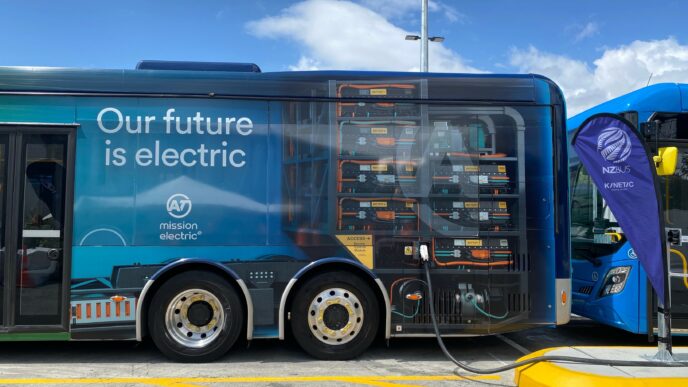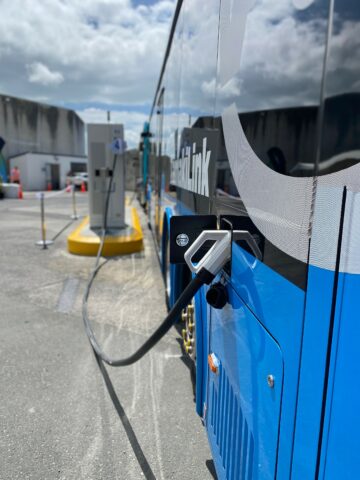
New Zealand’s first fully electric bus depot has been unveiled in Auckland’s Panmure.
The NZ Bus depot has the latest technology to reduce any burden on the grid and improve the environmental impact of Auckland’s electric bus fleet – all without putting Auckland’s energy supply at risk.
The depot is home to 35 electric buses (CRRC ET12Max three-axle battery electric buses) – each one charged up overnight via their own individual direct current charger.
The 35 are part of a total order of 152 e-buses agreed between Auckland Transport (AT) and NZ Bus in November 2021, three-axle buses trialled in Auckland from then.
The depot charging work cost about $2 million, funded by AT.

This is a significant step forward in implementing the Low Emission Bus Roadmap to decarbonise Auckland’s public transport, says AT interim chief executive Mark Lambert.
“It aligns with the government’s 2035 mandate for the full decarbonisation of urban buses in New Zealand,” he adds.
“These buses are the first tranche of electric buses, with more coming over the next two years. It’s been exciting to witness the transition to electric buses recently and we know our customers are enjoying the cleaner, quieter travel.
“This new technology manages when and how much each bus is charged – which is very important for load management on the Vector network and, of course, using off-peak energy prices.”
NZ Bus chief executive and Kinetic NZ head Calum Haslop says the e-bus depot launch has come through the hard work of multiple parties.
“The unveiling of this all-electric depot has been the result of NZ Bus, Auckland Transport, Vector, CRRC, EVISI, DGE and WSP all working together.
“What we are now operating is a cutting-edge approach to the efficient supply of battery electric zero-emission buses for Auckland,” Haslop explains.
“Kinetic is proud to have built and be operating this depot – Australasia’s largest all-electric bus operation.”
Vector’s electricity, gas and fibre chief operating officer Peter Ryan says a key focus is ensuring an affordable transition to a zero-carbon future, and the smart charging system is a crucial part of that. “By managing the timing of the e-bus charging, we can ensure the buses are ready for service each day, while keeping the cost of electrification down.”
AT, Vector and NZ Bus have adopted a smart-charging system which will be connected to Vector’s Distributed Energy Resource Management System.
This smart charging system manages e-bus charging during off-peak hours, typically overnight, to avoid increasing peak demand on the local electricity network.
Every 15 minutes, Vector sends the depot the network capacity available for charging buses for the next 24 hours. This enables the bus depot to optimise their bus charging schedule accordingly and avoids investment on the network.
The system also futureproofs the depot for potential development of additional bus-to-grid (B2G) systems – to transfer surplus energy from bus batteries back to the network.








